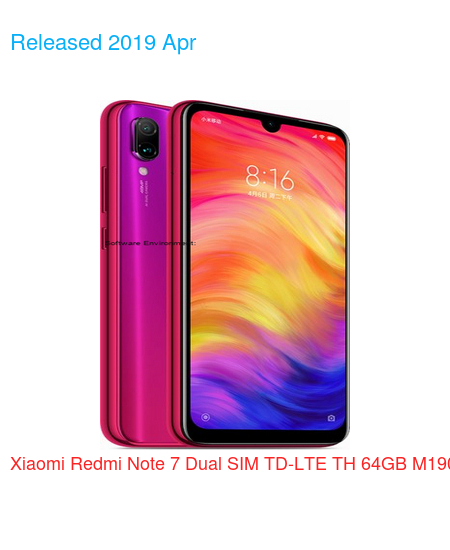| Brand | Xiaomi |
| Model | Redmi Note 7 Dual SIM TD-LTE TH 64GB M1901F7I |
| Released | 2019 Apr |
| Announced | 2019 Jan 24 |
| Hardware Designer | Xiaomi |
| Codename | Xiaomi Lavender |
| General Extras | Haptic touch feedback |
| Device Category | Smartphone |
| Width | 75.21 mm |
| Height | 159.21 mm |
| Depth | 8.1 mm |
| Dimensions | 2.96×6.27×0.32 inches |
| Mass | 186 g |
| Platform | Android |
| Operating System | Google Android 9.0 (Pie) |
| Software Extras | Voice Command , Navigation software , Intelligent personal assistant , Face Recognition |
| CPU Clock | 2210 MHz |
| CPU | Qualcomm Snapdragon 660 SDM660, 2017, 64 bit, octa-core, 14 nm, Qualcomm Adreno 512 GPU |
| RAM Type | LPDDR4x SDRAM |
| RAM Capacity (converted) | 4 GiB RAM |
| Non-volatile Memory Interface | Yes |
| Non-volatile Memory Capacity (converted) | 64 GB ROM |
| Display Notch | 1-notch |
| Display Diagonal | 160 mm |
| Resolution | 1080×2340 |
| Horizontal Full Bezel Width | 8.16 mm |
| Display Area Utilization | 81.3% |
| Pixel Density | 409 PPI |
| Display Type | Color IPS TFT LCD display |
| Number of Display Scales | 16.8M |
| Scratch Resistant Screen | Gorilla Glass 5 |
| Graphical Controller | Qualcomm Adreno 512 |
| Dedicated Graphics Memory | 0.25 MiB |
| GPU Clock: | 650 MHz |
| A/V Out | No |
| Microphone(s) | stereo |
| Loudspeaker(s): | mono |
| Audio Output: | 3.5mm |
| Supported Cellular Bands | GSM850 , GSM900 , GSM1800 , GSM1900 , UMTS2100 (B1) , UMTS1900 (B2) , UMTS850 (B5) , UMTS900 (B8) , LTE2100 (B1) , LTE1800 (B3) , LTE850 (B5) , LTE2600 (B7) , LTE900 (B8) , TD-LTE2300 (B40) , TD-LTE2500 (B41) bands |
| Supported Cellular Data Links | GPRS , EDGE , UMTS , HSUPA , HSUPA 5.8 , HSDPA , HSPA+ 21.1 , DC-HSDPA 42.2 , LTE , LTE 100/50 , LTE 150/50 , LTE 300/50 data links |
| SIM Card Slot | Nano-SIM (4FF) |
| Complementary Phone Services | Voice transmission , Voice speaker , Vibrate , Speakerphone , ANC , HD Voice , VoLTE |
| SAR (head) | 1.150 W/kg |
| SAR (body) | 1.170 W/kg |
| Dual Cellular Network Operation | Dual standby |
| Sec. Supported Cellular Networks: | GSM850 , GSM900 , GSM1800 , GSM1900 , UMTS2100 (B1) , UMTS1900 (B2) , UMTS850 (B5) , UMTS900 (B8) , LTE2100 (B1) , LTE1800 (B3) , LTE850 (B5) , LTE2600 (B7) , LTE900 (B8) , TD-LTE2300 (B40) , TD-LTE2500 (B41) |
| Sec. Supported Cellular Data Links: | GPRS , EDGE , UMTS , HSUPA , HSUPA 5.8 , HSDPA , HSPA+ 21.1 , DC-HSDPA 42.2 , LTE , LTE 100/50 , LTE 150/50 , LTE 300/50 |
| Sec. SIM Card Slot | Nano-SIM (4FF) |
| Touchscreen Type | Capacitive multi-touch screen |
| Expansion Interfaces | TransFlash , microSD , microSDHC , microSDXC |
| USB | USB 2.0 |
| USB Services | USB charging , USB fast charging , USB Host , USB OTG 1.3 , USB OTG 2.0 , USB PD |
| USB Connector | USB C reversible |
| Max. Charging Power | 10.0 W |
| Bluetooth | Bluetooth 5.0 |
| Wireless LAN | 802.11a , 802.11b , 802.11g , 802.11n , 802.11ac |
| Wireless Services | Wi-Fi Direct , Wi-Fi Tethering , WiDi |
| IR | Yes |
| FM Radio Receiver | No |
| Complementary Satellite Services | A-GPS , Geotagging , QuickGPS |
| Supported GLONASS protocol(s) | L1OF |
| Supported BeiDou system (BDS) | B1I BeiDou receiver |
| Camera Placement | Rear |
| Camera Image Sensor | CMOS |
| Image Sensor Pixel Size | 0.80 micrometer |
| Number of effective pixels | 48.0 MP camera |
| Aperture (W) | f/1.80 |
| Zoom | 1.0 x optical zoom |
| Focus | PD AF |
| Min. Equiv. Focal Length | 27 mm |
| Video Recording | 1920×1080 pixel |
| Flash | dual LED |
| Camera Extra Functions | EIS (video) , Pixel unification , HDR photo , HDR video , Red-eye reduction , Slow motion video , Burst mode , Refocus , Touch focus , Macro mode , Panorama Photo , Face detection , Face tagging , Smile detection , Face retouch , Face retouch (video) , Intelligent scene detection |
| Aux. Camera Image Sensor | CMOS |
| Aux. Camera Number of Pixels | 5.0 MP aux. cam |
| Aux. Camera Aperture (W) | f/2.40 |
| Aux. 2 Camera Image Sensor | No |
| Aux. 3 Camera Image Sensor | No |
| Aux. 4 Camera Image Sensor | No |
| Secondary Camera Placement | Front |
| Secondary Camera Sensor | CMOS |
| Secondary Camera Number of pixels | 13.0 MP sec. cam |
| Secondary Aperture (W) | f/2.00 |
| Secondary Video Recording | 1920×1080 pixel |
| Secondary Camera Extra Functions | HDR photo , HDR video , Burst mode , Panorama Photo , Face detection , Face tagging , Smile detection , Face retouch , Face retouch (video) , Intelligent scene detection |
| Sec. Aux. Cam. Image Sensor | No |
| Built-in compass | Yes |
| Built-in accelerometer | Yes |
| Built-in gyroscope | Yes |
| Additional sensors | FP sensor , L sensor , P sensor |
| Protection from solid materials | Yes |
| Protection from liquids | Yes |
| Battery | Li-ion polymer (LiPo) |
| Nominal Battery Capacity | 4000 mAh battery |
| Market Countries | Thailand |
| Market Regions | Asia , Southeast Asia |
| Added | 2024-06-17 |
Specifications data description of this 📱Xiaomi Redmi Note 7 Dual SIM TD-LTE TH 64GB M1901F7I📱
Title: Specification of the Device: A Comprehensive Look
Introduction:
In today’s world, technology has become an integral part of our lives. With so many devices available in the market, it is crucial to know the specifications of the device you plan to purchase. This blog post will provide an in-depth analysis of the features that make up a device. From the network and launch date to the battery and other unique features, we’ve got it all covered.
Lineup:
The lineup of a device includes various details such as the model, brand, and release date. This information helps buyers to know when a device was launched and how it has evolved over time. For instance, the device we are looking at was launched on LAUNCH📅 and belongs to a reputable brand.
Design:
The design of a device plays a significant role in attracting customers. The device has a sleek and modern look that appeals to consumers. Its BODY🏋️ is made up of high-quality materials that give it a premium feel. Furthermore, the DISPLAY🌈 is bright, and the colors are vivid, making it easy to use in various lighting conditions.
Specifications:
The specifications of a device are its most critical aspect, and they can make or break a sale. Here’s a breakdown of the device’s specifications:
🌐NETWORK: The device supports a range of networks, including 4G and 5G, providing users with fast and reliable internet connectivity.
🤖 OS 🛠️: The device runs on a user-friendly operating system that provides a seamless user experience.
🚀 Chipset 🛠️: The device uses an advanced chipset that ensures quick and efficient processing.
💪 CPU 🖥️: The CPU is powerful and can handle multiple tasks simultaneously without any lag.
🎮 GPU 💻: The GPU is designed for gaming, and it can handle high-end games with ease.
🧠 MEMORY 🗂️: The device has ample memory, allowing users to store all their files and multimedia without worrying about running out of space.
📷 CAMERA 🎥: The camera is of high quality, and it can capture stunning photographs and videos.
🔈 SOUND 🎵: The sound system is top-notch, providing clear and crisp audio for all your multimedia needs.
📡 COMMS 📶: The device supports various communication protocols, including Bluetooth and Wi-Fi.
💡 FEATURES 🎁: The device has several unique features, such as a fingerprint scanner and facial recognition, that enhance user security.
🔋 BATTERY🔌: The battery can last for an extended period, and it charges quickly, ensuring that users are never out of power for too long.
Conclusion:
In conclusion, a device’s specifications are crucial in making an informed purchase decision. This blog post has provided a comprehensive analysis of the features that make up a device. From the network and launch date to the battery and other unique features, the device has it all. We invite our readers to leave a comment and share their thoughts on the device.
Note: This blog post was generated using advanced AI technology that can create high-quality content within minutes. It is essential to note that while AI can generate content, it is vital to fact-check and ensure that the information provided is accurate and relevant.














